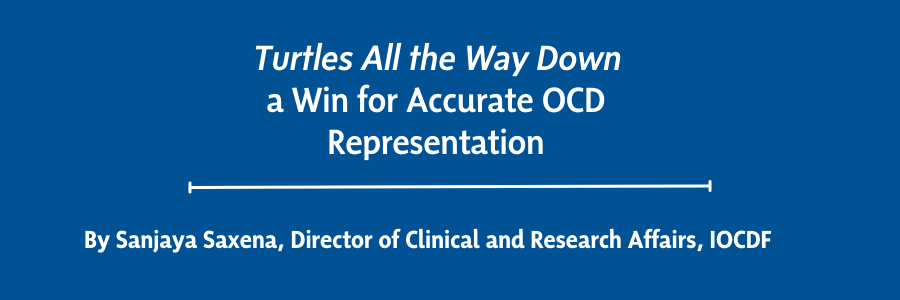By: Sanjaya Saxena, MD, Director of Clinical and Research Affairs, IOCDF
Too often, obsessive compulsive disorder is portrayed in films, TV shows, and other media as a personality quirk. It may be shown only in the most basic of ways with limited explanation, such as someone vigorously washing their hands or tapping a door frame. Or worse, it’s used as a punchline or correlated with simply being organized.
These depictions—seen time and again by millions of viewers—are not only discouraging to those within the OCD community, but are actively harmful in that they prevent people who are experiencing true OCD symptoms to know what it is that is causing them distress and to seek appropriate care. On average, it can take more than 7 years before a person suffering from OCD starts receiving treatment. Accurate and realistic representation of OCD is critical to helping the approximately 80 million people globally with OCD and their loved ones to destigmatize the disorder, raise awareness, and promote diagnosis and treatment.
To support accurate portrayal of OCD, the International OCD Foundation offers expert consultation, resources, and information about OCD and related disorders.
Such was the case with our recent partnership with HBO Max for the acclaimed film Turtles All the Way Down, the best-selling story of teen Aza Holmes. The film follows Holmes as she navigates the challenges of teenage life, and of OCD.
Ahead of the film’s release, IOCDF collaborated with the film’s director, actors, and others to prepare them for questions they might receive about OCD while doing press interviews. We are proud to have supported this team in helping to promote this welcome representation of OCD.
Here’s why we think this film gets it right, and what others could learn from this example:
- It’s told by someone with lived experience. The film is an adaptation of the novel written by 2016’s IOCDF Illumination Award Winner John Green, who utilizes his lived experience with OCD to enhance his storytelling.
- It creatively captures the true experience of having obsessional thoughts, fears, and images. Using powerful visual and audio effects, the viewer both sees and hears how Aza is actually experiencing intrusive obsessions in a realistic and evocative way. For example, when Aza has an acute attack of OCD symptoms, we hear the repeating concerns in her head, see her visualizations, and are fully immersed in her anguish.
- It truly encapsulates the torturous nature of OCD. Turtles All the Way Down doesn’t shy away from the misery, pain, and impairment that are so often a result of OCD. Viewers see the major impact on Aza’s life, particularly in how it inhibits her ability to interact with people and how it deeply affects her social life and ability to do things. The emotional and visceral impact of this portrayal is stunning and sets it apart from the superficial representations in other media.
- It’s geared toward young adults. We know that OCD typically appears between the ages of 8 and 12 or between late teens and early adulthood, making youth and young adults an essential group to share accurate portrayals of OCD with. Yet many media portrayals of OCD are geared more toward adults. Turtles All the Way Down is staunchly geared toward the young adult market, providing a way for high school students to connect deeply with the characters. It’s even a great film for parents of youth with OCD to watch to help gain a deeper understanding of their child’s experience.
It has been incredible to see Turtles All the Way Down be so well and widely received. The film represents a critical win for the OCD and broader mental health communities in terms of accurately portraying the condition and providing viewers with a greater understanding of what it’s truly like.
We at IOCDF formally applaud John Green and the cast and crew of Turtles All the Way Down for this moving and truthful portrait.
We are grateful for the opportunity to have been involved with this project, and encourage production companies to reach out to us at media@iocdf.org for support in portraying OCD in an accurate and responsible way across our screens.


Leave a Reply